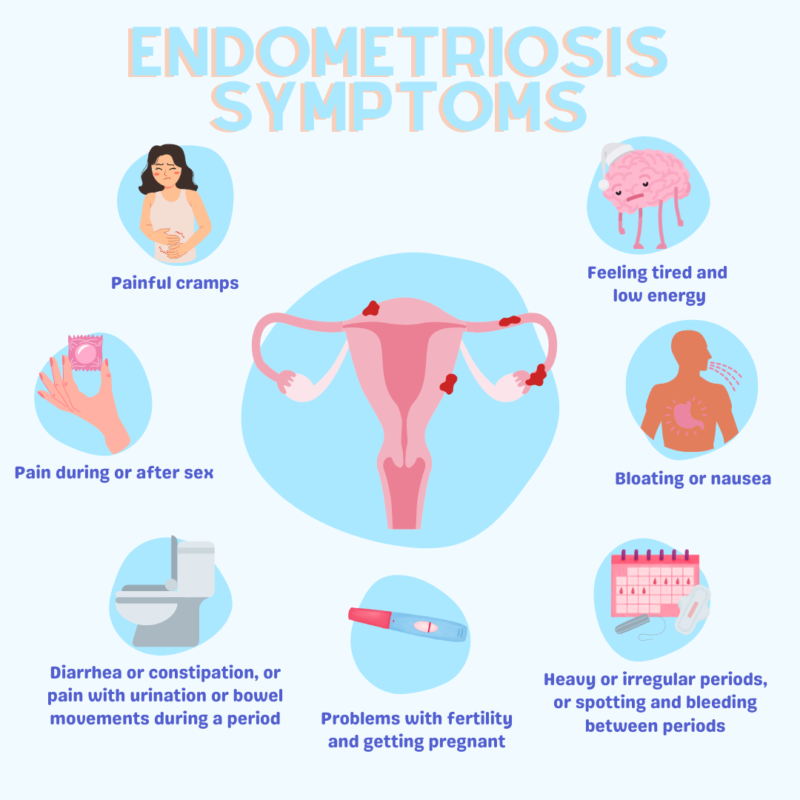Endometriosis
What is Endometriosis?
Endometriosis is a condition where tissue similar to the inner lining of the uterus grows outside of the uterus. It’s often a pretty painful and can sometimes interfere with someone’s daily life.
Endometriosis tissue acts like the tissue that lines the uterus; it thickens and breaks down with each period, but because it grows outside of the uterus, it does not shed during a period like normal endometrial menstrual tissue does. This can cause scar tissue to build up on the uterus and surrounding areas which can cause pain and other health problems.
What are the Symptoms of Endometriosis?

NOTE:
Endometriosis can be hard to diagnose because it can mirror symptoms of a lot of other conditions. The only way to know for sure if you have endometriosis is to talk to a healthcare professional like a family doctor.
What level of pain is normal?
There is no true ‘normal’ because period pain can feel different for everyone. Often period pain is dismissed as a normal thing that people with uteruses have to go through, but pain should not be interfering with your daily life. If pain is causing you to miss school or work, or making it hard for you to carry out regular tasks, and just enjoy your life, then you may want to consider getting it checked out. You deserve to live your life free from chronic pain!
When to see a doctor?
The best way to know if your menstrual pain is normal for you is to talk to a medical professional. Not only will they be able to properly test and diagnose you, but they can also offer treatment plans that could help manage the pain. Self-diagnosing might be a bit tricky, but you should especially talk to a doctor if you are experiencing any of the following symptoms:
- Period pain that feels unbearable and stops you from carrying out daily tasks like going to school/work
- Cramps lasting a long time (more than 2 days)
- You find that over-the-counter pain medications such as ibuprofen are not relieving your pain
- You have cramps even when you are not on your period
- You notice your cramps changing over time
- You are experiencing other intense symptoms along with your cramps; including heavy bleeding, vomiting, or fever
What if my doctor isn’t taking my pain seriously?
You deserve to have a healthcare professional that listens to your concerns and takes them seriously. Sometimes that doesn’t happen: you may find that some doctors dismiss your pain as something normal instead of looking into it to figure out the actual cause. If you’re finding that you’re struggling to get your doctor to listen to you, you may want to find another healthcare professional to get a second opinion.
This isn’t to say that you shouldn’t ever trust your doctor, but not all medical professionals take issues like endometriosis seriously and you may have to advocate for yourself a bit. This can include seeing another doctor, going to a women’s health clinic (they’re often gender inclusive and just focus on treating people with uteruses), or seeing a specialist such as a gynecologist.
It may seem like more work, but you deserve to be taken seriously and live your life pain free. You know your body best and if you feel like your pain is getting in the way of you leading a normal life, then it’s a good idea to do what you can so that you can be treated properly, and manage your pain effectively.
How is it treated?
There is no cure for endometriosis but some treatments are available to help relieve pain, remove the endometriosis tissue, improve fertility, and lower the chance of the condition returning or getting worse.
To know what treatment would work best for you, you can visit a healthcare professional. They’ll talk about the treatment options with you and let you know the potential risks and benefits of each one.
Treatments
Currently endometriosis is managed through medication, hormone therapy, and surgery:
- Over-the-counter pain medications such as ibuprofen or naproxen can help reduce pain and bleeding.
- Hormone therapy such as birth control or other hormonal medications can be prescribed to reduce pain and bleeding, and can sometimes be used to skip a period if needed.
- Surgery which can be used to remove scar tissue and growths. This can lower pain and can also improve fertility if you are looking to get pregnant.
Resources
- Mayo Clinic – Endometriosis
- Health Partners – When to see a doctor for menstrual cramps
- Teen Health Source – Period Basics
If you have questions about this topic, feel free to contact one of our peer educators. [Link]
Last Edited: May 2024






